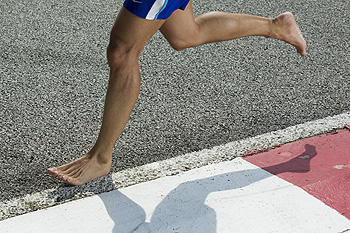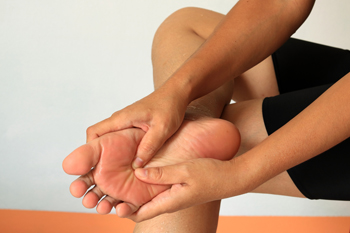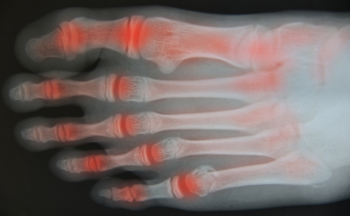Merrillville, IN
Munster, IN
January 2022
What Causes Toe Cramps?
Just like other parts of your body, your feet and toes have many muscles. These muscles can become cramped, leading to pain and difficulty walking. The pain is usually temporary and often goes away without treatment. Possible causes of toe cramps include having tight or weak muscles, a muscle injury, wearing poorly-fitted shoes, and being dehydrated. Sometimes, toe cramps can be a symptom of a more serious problem. For example, poor circulation can make the feet and toes ache and spasm, while nerve damage can cause pain, cramps, tingling, and numbness in the toes. Both of these conditions are often seen in patients who have diabetes. Another potential cause of toe cramps is arthritis, a condition that causes pain and inflammation in joints, including those in the toes. If you have persistent toe cramps that are bothering you, it is strongly suggested that you seek the care of a podiatrist.
Foot Pain
Foot pain can be extremely painful and debilitating. If you have a foot pain, consult with Ahmad Elsamad, DPM from The Institute of Foot & Ankle Reconstructive Surgery . Our doctor will assess your condition and provide you with quality foot and ankle treatment.
Causes
Foot pain is a very broad condition that could be caused by one or more ailments. The most common include:
- Bunions
- Hammertoes
- Plantar Fasciitis
- Bone Spurs
- Corns
- Tarsal Tunnel Syndrome
- Ingrown Toenails
- Arthritis (such as Gout, Rheumatoid, and Osteoarthritis)
- Flat Feet
- Injury (from stress fractures, broken toe, foot, ankle, Achilles tendon ruptures, and sprains)
- And more
Diagnosis
To figure out the cause of foot pain, podiatrists utilize several different methods. This can range from simple visual inspections and sensation tests to X-rays and MRI scans. Prior medical history, family medical history, and any recent physical traumatic events will all be taken into consideration for a proper diagnosis.
Treatment
Treatment depends upon the cause of the foot pain. Whether it is resting, staying off the foot, or having surgery; podiatrists have a number of treatment options available for foot pain.
If you have any questions, please feel free to contact our offices located in Merrillville, and Munster, IN . We offer the newest diagnostic and treatment technologies for all your foot care needs.
What Is Peripheral Neuropathy?
Peripheral neuropathy is nerve damage within the peripheral nervous system, which communicates with the central nervous system (involving the brain and spinal cord). Diabetes often causes peripheral neuropathy, however, it can also occur due to genetics, infections, injuries, hormonal imbalances, or other medical conditions. Peripheral neuropathy may cause numbness, weakness, muscle twitching or cramps, changes in nails, skin and hair, and a pins-and-needles sensation in the legs and feet. It may also be difficult to maintain balance or feel changes in temperature or pain, and you may experience disturbances in your emotions and sleep patterns. If you have any of these symptoms, it is suggested that you contact a podiatrist. They can help diagnose peripheral neuropathy and manage its symptoms with oral medications, orthotic devices, regular checkups and advice on proper foot care.
Neuropathy
Neuropathy can be a potentially serious condition, especially if it is left undiagnosed. If you have any concerns that you may be experiencing nerve loss in your feet, consult with Ahmad Elsamad, DPM from The Institute of Foot & Ankle Reconstructive Surgery . Our doctor will assess your condition and provide you with quality foot and ankle treatment for neuropathy.
What Is Neuropathy?
Neuropathy is a condition that leads to damage to the nerves in the body. Peripheral neuropathy, or neuropathy that affects your peripheral nervous system, usually occurs in the feet. Neuropathy can be triggered by a number of different causes. Such causes include diabetes, infections, cancers, disorders, and toxic substances.
Symptoms of Neuropathy Include:
- Numbness
- Sensation loss
- Prickling and tingling sensations
- Throbbing, freezing, burning pains
- Muscle weakness
Those with diabetes are at serious risk due to being unable to feel an ulcer on their feet. Diabetics usually also suffer from poor blood circulation. This can lead to the wound not healing, infections occurring, and the limb may have to be amputated.
Treatment
To treat neuropathy in the foot, podiatrists will first diagnose the cause of the neuropathy. Figuring out the underlying cause of the neuropathy will allow the podiatrist to prescribe the best treatment, whether it be caused by diabetes, toxic substance exposure, infection, etc. If the nerve has not died, then it’s possible that sensation may be able to return to the foot.
Pain medication may be issued for pain. Electrical nerve stimulation can be used to stimulate nerves. If the neuropathy is caused from pressure on the nerves, then surgery may be necessary.
If you have any questions, please feel free to contact our offices located in Merrillville, and Munster, IN . We offer the newest diagnostic and treatment technologies for all your foot care needs.
Do You Suffer From Painful Feet?
Can Osteoarthritis Occur in the Ankles?
Osteoarthritis in the ankles is a very painful condition which causes the cartilage that protects bones in the ankle to deteriorate. This leads to bones rubbing against each other, swelling, stiffness, tenderness and intense pain in the ankle, and a decreased ability to walk or bend and flex your ankles. Several factors can increase your risk of developing osteoarthritis (OA) in the ankles, such as previous ankle injuries, recurrent high-impact stress on the ankles, misaligned joints, genetics, obesity and age. Your podiatrist can diagnose OA with a physical exam to test joint tenderness and swelling, X-rays, a gait analysis to assess your stride and foot and ankle biomechanics, and blood tests to distinguish OA from other forms of arthritis. There are many ways a podiatrist can help you manage the symptoms of OA, from lifestyle changes and physical therapy to various braces and orthotic devices, topical creams, pain relievers, and steroid injections. In severe cases of OA, surgery may be beneficial to remove spurs and loose cartilage, fuse the ankle to reduce pain, or replace damaged cartilage and bone with prosthetic parts (arthroplasty). If you believe you may have osteoarthritis in the ankle, it is suggested that you make an appointment as soon as possible to begin treatment.
Arthritis can be a difficult condition to live with. If you are seeking treatment, contact Ahmad Elsamad, DPM from The Institute of Foot & Ankle Reconstructive Surgery . Our doctor can provide the care you need to keep you pain-free and on your feet.
Arthritic Foot Care
Arthritis is a term that is commonly used to describe joint pain. The condition itself can occur to anyone of any age, race, or gender, and there are over 100 types of it. Nevertheless, arthritis is more commonly found in women compared to men, and it is also more prevalent in those who are overweight. The causes of arthritis vary depending on which type of arthritis you have. Osteoarthritis for example, is often caused by injury, while rheumatoid arthritis is caused by a misdirected immune system.
Symptoms
- Swelling
- Pain
- Stiffness
- Decreased Range of Motion
Arthritic symptoms range in severity, and they may come and go. Some symptoms stay the same for several years but could potentially get worse with time. Severe cases of arthritis can prevent its sufferers from performing daily activities and make walking difficult.
Risk Factors
- Occupation – Occupations requiring repetitive knee movements have been linked to osteoarthritis
- Obesity – Excess weight can contribute to osteoarthritis development
- Infection – Microbial agents can infect the joints and trigger arthritis
- Joint Injuries – Damage to joints may lead to osteoarthritis
- Age – Risk increases with age
- Gender –Most types are more common in women
- Genetics – Arthritis can be hereditary
If you suspect your arthritis is affecting your feet, it is crucial that you see a podiatrist immediately. Your doctor will be able to address your specific case and help you decide which treatment method is best for you.
If you have any questions, please feel free to contact our offices located in Merrillville, and Munster, IN . We offer the newest diagnostic and treatment technologies for all your foot care needs.
Why Some People Sweat Excessively on Their Feet
Thermoregulation is the body’s process of maintaining its core internal temperature, which is typically between 98°F and 100°F. Sweating is one of the mechanisms the body uses to cool down because as sweat evaporates it cools the skin, which lowers our internal temperature. Excessive sweating in specific areas of the skin is known as hyperhidrosis, or sometimes is referred to as plantar hyperhidrosis when it occurs in the feet. The specific cause of Hyperhidrosis is unknown, however its possible triggers are believed to include emotions, hormones, physical activity, or brain signals which inaccurately prompt sweat glands to overreact even when it is not necessary for thermoregulation. Sweat that sits stagnant on the skin of the feet can compromise the top layer of skin, making it more susceptible to bacteria which can create odor and even expose the body to more serious bacteria. Podiatrists have a variety of treatment options to help control this embarrassing and uncomfortable condition.
If you are suffering from hyperhidrosis contact Ahmad Elsamad, DPM of The Institute of Foot & Ankle Reconstructive Surgery . Our doctor can provide the care you need to attend to all of your foot and ankle needs.
Hyperhidrosis of the Feet
Hyperhidrosis is a rare disorder that can cause people to have excessive sweating of their feet. This can usually occur all on its own without rigorous activity involved. People who suffer from hyperhidrosis may also experience sweaty palms.
Although it is said that sweating is a healthy process meant to cool down the body temperature and to maintain a proper internal temperature, hyperhidrosis may prove to be a huge hindrance on a person’s everyday life.
Plantar hyperhidrosis is considered to be the main form of hyperhidrosis. Secondary hyperhidrosis can refer to sweating that occurs in areas other than the feet or hands and armpits. Often this may be a sign of it being related to another medical condition such as menopause, hyperthyroidism and even Parkinson’s disease.
In order to alleviate this condition, it is important to see your doctor so that they may prescribe the necessary medications so that you can begin to live a normal life again. If this is left untreated, it is said that it will persist throughout an individual’s life.
A last resort approach would be surgery, but it is best to speak with your doctor to find out what may be the best treatment for you.
If you have any questions please feel free to contact our offices located in Merrillville, and Munster, IN . We offer the newest diagnostic and treatment technologies for all your foot and ankle needs.












